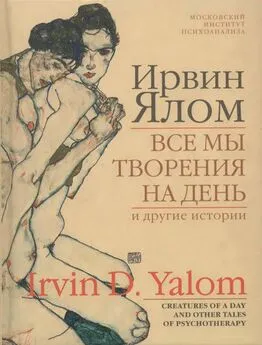Ирвин Ялом - The Schopenhauer Cure
- Название:The Schopenhauer Cure
- Автор:
- Жанр:
- Издательство:неизвестно
- Год:неизвестен
- ISBN:нет данных
- Рейтинг:
- Избранное:Добавить в избранное
-
Отзывы:
-
Ваша оценка:
Ирвин Ялом - The Schopenhauer Cure краткое содержание
The Schopenhauer Cure - читать онлайн бесплатно полную версию (весь текст целиком)
Интервал:
Закладка:
his seat. When alone, he always preferred sitting at the counter—like all of his patients,
he was uncomfortable eating by himself at a restaurant table.
Julius ordered his usual: California rolls, broiled eel, and a variety of vegetarian
maki. He loved sushi but carefully avoided raw fish because of his fear of parasites. That
whole battle against outside marauders—now, what a joke it seemed! How ironic that, in
the end, it would be an inside job. To hell with it; Julius threw caution to the wind and
ordered some ahi sushi from the astonished chef. He ate with great relish before rushing
out to Toyon Hall and to his first meeting with Arthur Schopenhauer.
6
Mom and Pop
Schopenhauer
—
Zu Hause
_________________________
Thesolid foundations of our
view of the world and thus its
depth or shallowness are
formed in the years of
childhood. Such a view is
subsequently elaborated and
perfected, yet essentially it
is not altered.
_________________________
What kind of a man was Heinrich Schopenhauer? Tough, dour, repressed, unyielding,
proud. The story is told that in 1783, five years before Arthur`s birth, Danzig was
blockaded by the Prussians and food and fodder were scarce. The Schopenhauer family
was forced to accept the billeting of an enemy general at their country estate. As a
reward, the Prussian officer offered to grant Heinrich the privilege of forage for his
horses. Heinrich`s reply? «My stable is well stocked, sir, and when the food supply runs
out I will have my horses put down.»
And Arthur`s mother, Johanna? Romantic, lovely, imaginative, vivacious,
flirtatious. Though all of Danzig in 1787 considered the union of Heinrich and Johanna a
brilliant event, it proved to be a tragic mismatch. The Troiseners, Johanna`s family, came
from a modest background and had long regarded the lofty Schopenhauers with awe.
Hence, when Heinrich, at the age of thirty–eight, came to court the seventeen–year–old
Johanna, the Troiseners were jubilant and Johanna acquiesced to her parents` choice.
Did Johanna regard her marriage as a mistake? Read her words written years later
as she warned other young women facing a matrimonial decision: «Splendor, rank, and
title exercise an all too seductive power over a young girl`s heart luring women into tying
a marriage knot...a false step for which they must suffer the hardest punishment the rest
of their lives.»
«Suffer the hardest punishment the rest of their lives»—strong words from Arthur`s
mother. In her journals she confided that before Heinrich courted her she had had a young
love, which fate took from her, and it was in a state of resignation that she had accepted
Heinrich Schopenhauer`s marriage proposal. Did she have a choice? Most likely not. This
typical eighteenth–century marriage of convenience was arranged by her family for
reasons of property and status. Was there love? There was no question of love between
Heinrich and Johanna Schopenhauer. Never. Later, in her memoirs, she wrote, «I no more
pretended ardent love than he demanded it.» Nor was there abundant love for others in
their household—not for the young Arthur Schopenhauer, nor for his younger sister,
Adele, born nine years later.
Love between parents begets love for the children. Occasionally, one hears tales of
parents whose great love for each other consumes all the love available in the household,
leaving only love–cinders for the children. But this zero–sum economic model of love
makes little sense. The opposite seems true: the more one loves, the more that one
responds to children, to everyone, in a loving manner.
Arthur`s love–bereft childhood had serious implications for his future. Children
deprived of a maternal love bond fail to develop the basic trust necessary to love
themselves, to believe that others will love them, or to love being alive. In adulthood they
become estranged, withdraw into themselves, and often live in an adversarial relationship
with others. Such was the psychological landscape that would ultimately inform Arthur`s
worldview.
7
_________________________
If we look at life in its small
details, how ridiculous it all
seems. It is like a drop of
water seen through a micro–scope, a single drop teeming
with protozoa. How we laugh as
they bustle about so eagerly
and struggle with one another.
Whether here, or in the little
span of human life, this
terrible activity produces a
comic effect.
_________________________
At five minutes to seven Julius knocked out the ashes from his meerschaum pipe and
entered the auditorium in Toyon Hall. He took a seat in the fourth row on the side aisle
and looked about the amphitheater: Twenty rows rose sharply from the entry level where
the lecture podium stood. Most of the two hundred seats were vacant; roughly thirty were
broken and wrapped with yellow plastic ribbon. Two homeless men and their collections
of newspapers sprawled across seats in the last row. Approximately thirty seats were
occupied by unkempt students randomly sprinkled throughout the auditorium with the
exception of the first three rows which remained vacant.
Just like a therapy group, Julius thought, no one wants to sit near to the leader.
Even in his group meeting earlier that day the seats on either side of him had been left
vacant for the late members, and he had joked that a seat next to him seemed to be the
penalty for tardiness. Julius thought of the group therapy folklore about seating; that the
most dependent person sits to the leader`s right, whereas the most paranoid members sit
directly opposite; but, in his experience, the reluctance to sit next to the leader was the
only rule that could be counted on with regularity.
The shabbiness and dilapidation of Toyon Hall was typical of the entire campus of
California Coastal College, which had begun life as an evening business school, then
expanded and flowered briefly as an undergraduate college, and was now obviously in a
phase of entropy. On his walk to the lecture through the unsavory tenderloin, Julius had
found it difficult to distinguish unkempt students from homeless denizens of the
neighborhood. What teacher could avoid demoralization in this setting? Julius began to
understand why Philip wanted to switch careers by moving into clinical work.
He checked his watch. Seven o`clock exactly and right on cue Philip entered the
auditorium, dressed in the professorial uniform of checkered khaki pants, shirt, and a tan
corduroy jacket with sewed–on elbow patches. Extracting his lecture notes from a
properly scuffed briefcase and, without so much as a glance at his audience, he began:
This is the survey of Western philosophy—lecture eighteen—Arthur Schopenhauer.
Tonight I shall proceed differently and stalk my prey more indirectly. If I appear
desultory, I ask your forbearance—I promise I shall soon enough return to the matter
at hand. Let us begin by turning our attention to the great debuts in history.
Philip scanned his audience for some nod of comprehension and, failing to find it,
crooked his forefinger at one of the students sitting nearest him and pointed to the
blackboard. He then spelled out and defined three words,d–e–s–u–l–t–o–r–y, f–o–r–e–b–e–a–r–a-
n–c–e, andd–eb–u–t, which the student dutifully copied onto the blackboard. The student
started to return to his seat, but Philip pointed to a first–row seat, instructing him to
remain there.
Now for great debuts; trust me—my purpose for beginning in such a fashion will, in
time, become apparent. Imagine Mozart stunning the Viennese royal court as he
performed flawlessly on the harpsichord at the age of nine. Or, if Mozart does not
strike a familiar chord(here the faintest trace of a smile), imagine something more
familiar to you, the Beatles at nineteen playing their own compositions to Liverpool
audiences.
Other amazing debuts include the extraordinary debut of Johann Fichte.(Here a
signal to the student to write F–i–c–h–t–eon the board.) Does any one of you remember
his name from my last lecture in which I discussed the great German idealist
philosophers who followed Kant in the late eighteenth and early nineteenth centuries:
Hegel, Schelling, and Fichte? Of these, Fichte`s life and his debut was the most
remarkable for he began life as a poor uneducated goose shepherd in Rammenau, a
small German village whose only claim to fame was its clergyman`s inspired sermons
every Sunday.
Well, one Sunday a wealthy aristocrat arrived at the village too late to hear the
sermon. As he stood, obviously disappointed, outside the church, an elderly villager
approached him and told him not to despair because the gooseherd, young Johann,
could repreach the sermon to him. The villager fetched Johann, who, indeed, repeated
the entire lecture verbatim. So impressed was the baron by the gooseherd`s
astoundingly retentive mind that he financed Johann`s education and arranged for him
to attend Pforta, a renowned boarding school later attended by many eminent German
thinkers, including the subject of our next lecture, Friedrich Nietzsche.
Johann excelled in school and later at the university, but when his patron died,
Johann had no means of support and took a tutoring job in a private home in Germany
where he was hired to teach a young man the philosophy of Kant, whom he had not
yet read himself. Soon he was entranced by the work of the divine Kant…
Philip suddenly looked up from his notes to survey his audience. Seeing no glint of
recognition in any eyes, he hissed at his audience:
Hello, anybody home? Kant, Immanuel Kant, Kant, Kant, remember?»(He motioned
to the blackboard scribe to write K–a–n–t.) We spent two hours on him last week?
Kant, the greatest, along with Plato, of all the world`s philosophers. I give you my
word: Kant will be on the final. Ah ha, there`s the ticket...I see stirrings of life,
movement, one or two eyes opening. A pen making contact with paper.
So where was I? Ah, yes. The gooseherd. Fichte was next tendered a position
as a private tutor in Warsaw and, penniless, walked all the way only to have the job
denied him when he arrived. Since he was only a few hundred miles from
Königsberg, the home of Kant, he decided to walk there to meet the master in person.
After two months he arrived at Königsberg and, audaciously, knocked on Kant`s door
but was not granted an audience. Kant was a creature of habit and not inclined to
receive unknown visitors. Last week I described to you the regularity of his
schedule—so exact that the townspeople could set their watches by seeing him on his
daily walk.
Fichte assumed he was refused entry because he had no letters of
recommendation and decided to write his own in order to gain an audience with Kant.
In an extraordinary burst of creative energy he wrote his first manuscript, the
renownedCritique of All Revelation, which applied Kant`s views on ethics and duty to
the interpretation of religion. Kant was so impressed with the work that he not only
Читать дальшеИнтервал:
Закладка:









